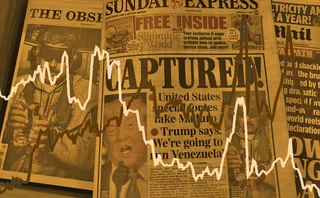
'Litmus test' case as banks charged with fraud over Milan restructuring
Four banks to stand trial over Milan restructuring trade

Four banks that arranged a mammoth debt restructuring for Milan will stand trial for fraud in May, a judge ruled at a hearing in the city on March 17. The case is being seen as a litmus test for other Italian municipalities nursing grievances over their own trades - if the banks lose, it could open the floodgates.
"This is really, really important for Italy," says a technical adviser working for one of the four dealers. "If the prosecutors find the banks guilty, then you can expect tens if not hundreds of similar cases, which could have a big economic impact on the industry."
The key question is whether the banks - Depfa, Deutsche, JP Morgan and UBS - misrepresented the deal, which replaced a host of small loans with a €1.68 billion bond, maturing in 2035. It was the biggest municipal debt issue Europe had seen at that time.
The bond paid investors a fixed coupon of 4.019% that Milan swapped into floating, while capping and flooring the liability at 6.19% and 3.48%. At the time of inception, 12-month Euribor rates were around 2.06%, giving the collar a negative market value. But rates were expected to increase - the forward curve at the time saw rates jumping to 3.6% by 2010 and remaining within the collar range thereafter, says the technical adviser.
Under Italian law, municipal debt can only be replaced if the transaction has a net benefit - in the state's own language, the municipality has to believe the restructuring passes a test of ‘economic convenience'. The banks carried out these calculations for Milan and claimed the bond would save the city about €55 million compared with its existing loans.
The dealers are accused of misleading the city in two main ways. First, they should have included in their calculation the market value of the swap and its collar, the prosecutor argues. Second, they should also have included the cost of closing out an existing, more complex swap that was sold to Milan by UniCredit some years previously to hedge a portion of the city's outstanding loans.
Italian municipalities are only allowed to use derivatives as a hedge, so once the loans had been replaced by a bond, the UniCredit swap was no longer hedging anything, and had to be wound up at a cost of roughly €90 million to Milan.
"The prosecutor says the positive €55 million would have been negative if it included the market value of the collared swap and hugely negative if the unwind of the UniCredit trade was also taken into account," says the technical adviser.
The second objection is the weaker of the two, he argues - the negative value of the UniCredit swap existed independently of the new transaction and had nothing to do with the debt restructuring. But the prosecutor's first claim is more difficult to dismiss. The banks have a number of possible defences. First, they may claim there is no legal requirement for them to carry out the economic convenience test: in other words, they were doing Milan a favour and the city chose to rely on their numbers. Second, the brief description of the test in Italian law states only that the value of the old and new liabilities have to be compared - but a separate law states derivatives cannot be classified as liabilities.
In addition to these two defences, the banks will also argue that even if they had included the value of the swap and collar, the restructuring as a whole would still have saved money for Milan. The prosecutor sees it differently, and the disagreement rests on the discount rate used to value the derivatives by each side - wider spreads would make the economic convenience test easier to pass by reducing the negative mark-to-market of the collar, says the adviser.
As such, the banks argue in favour of a discount curve derived from the rates charged at the time by the Cassa depositi e prestiti, a state-backed lender to the Italian public sector, while the prosecution team is expected to argue for the use of a risk-free rate.
At this point, the trial starts looking like an intellectual shoot-out between the competing teams of technical advisers - there are around 20 in total involved in the criminal case, with more engaged in the parallel civil suit. Many of them teach at or have graduated from Milan's Bocconi University and have known each other for years. The technical adviser says of his counterparts on the prosecution team: "They're very smart and have made some very, very good points. We have to try to be as smart as them."
One lawyer with knowledge of the case argues it doesn't have to be so technical. In his view, arguments about the nitty-gritty of the economic convenience test are trumped by the basic requirement for banks to deal with their counterparties in good faith and to look after their best interests, which is enshrined in Italian law. "I don't believe for a second the banks were trying to do this without fraud - not for a second," he says.
Only users who have a paid subscription or are part of a corporate subscription are able to print or copy content.
To access these options, along with all other subscription benefits, please contact info@risk.net or view our subscription options here: http://subscriptions.risk.net/subscribe
You are currently unable to print this content. Please contact info@risk.net to find out more.
You are currently unable to copy this content. Please contact info@risk.net to find out more.
Copyright Infopro Digital Limited. All rights reserved.
As outlined in our terms and conditions, https://www.infopro-digital.com/terms-and-conditions/subscriptions/ (point 2.4), printing is limited to a single copy.
If you would like to purchase additional rights please email info@risk.net
Copyright Infopro Digital Limited. All rights reserved.
You may share this content using our article tools. As outlined in our terms and conditions, https://www.infopro-digital.com/terms-and-conditions/subscriptions/ (clause 2.4), an Authorised User may only make one copy of the materials for their own personal use. You must also comply with the restrictions in clause 2.5.
If you would like to purchase additional rights please email info@risk.net
More on Markets
S&P bull run drives interest in reset and lookback hedges
Variable strike put options proved popular alternative hedging format of 2025
US mutual funds slash short euro positions at record pace
Counterparty Radar: Pimco cut $4.6bn of EUR/USD puts in Q3 amid changing stance on dollar direction
Nomura hires new global eFX head
Mark McMillan to oversee e-trading and sales activities in newly created role
Trump’s LatAm gambit spurs FX hedging rush
Venezuela op boosts risk reversals as investors look to protect carry trades
One Trading brings 24/7 equity trading to Europe
Start-up exchange will launch perpetual futures Clob in Q1 after AFM nod
FXGO volumes surge despite fee switch-on
Dealers split on whether levy is behind volume increases across SDPs
Banks hope new axe platform will cut bond trading costs
Dealer-backed TP Icap venture aims to disrupt dominant trio of Bloomberg, MarketAxess and Tradeweb
Kyriba sees uptake in AI-assisted FX hedging tools
Automated data collection and cleaning helps corporates create better hedges and has cut unexplained P&L moves by 87%, says vendor








